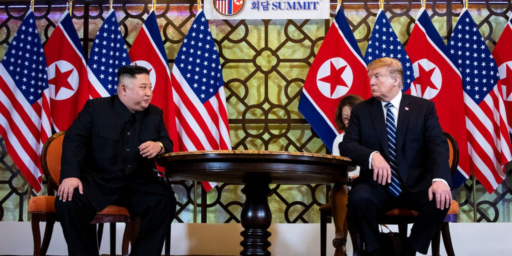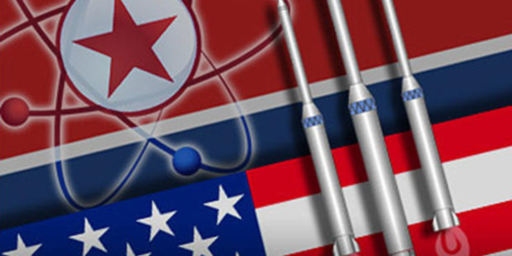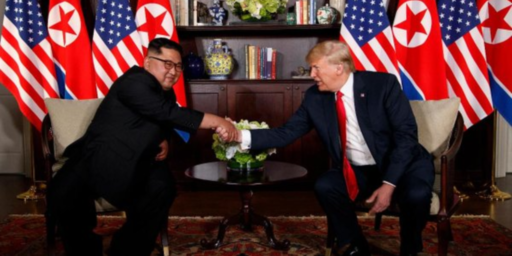North Korea Agrees to Disable Nuclear Reactor
North Korea has agreed to disable its main nuclear reactor and allow intrusive verification measures.
North Korea will provide a complete list of its nuclear programs and disable its facilities at its main reactor complex by Dec. 31, actions that will be overseen by a U.S.-led team, the six nations involved in disarmament talks said Wednesday. Chinese Vice Foreign Minister Wu Dawei said that as part of the agreement, Washington will lead an expert group to Pyongyang “within the next two weeks to prepare for disablement” and will fund those initial activities. “The disablement of the five megawatt experimental reactor at Yongbyon, the reprocessing plant at Yongbyon and the nuclear fuel rod fabrication facility at Yongbyon will be completed by 31 December 2007,” said Wu, who read the statement from the six nations to reporters, but did not take any questions.
The Bush administration welcomed the agreement, calling it significant progress. “These second-phase actions effectively end the DPRK’s production of plutonium — a major step towards the goal of achieving the verifiable denuclearization of the Korean Peninsula,” said Gordon Johndroe, spokesman for the White House’s National Security Council. The complex at Yongbyon has been at the center of North Korea’s nuclear weapons programs for decades and is believed to have produced the nuclear device Pyongyang detonated a year ago to prove its long-suspected nuclear capability.
[…]
The statement also said the U.S. and North Korea will “increase bilateral exchanges and enhance mutual trust” but did not set a specific timetable for when Washington will remove Pyongyang from a list of countries that sponsor terrorism — a key North Korean demand. Arrangements will be made in future meetings between the two on normalizing their relations, the statement said. In addition, the statement reiterated the five other countries’ commitment to deliver the fuel oil and other energy and economic assistance as spelled out in the February deal.
We’ve been down this road before, of course, having seemingly reached a similar point in 1994. The six party nature of this deal, though, should make it much easier to enforce, since all of the DPRK’s neighbors are part of the solution. Then again, it also complicates matters:
Shortly after Wednesday’s deal was announced, however, Japan said it would not provide aid to North Korea or lift its economic sanctions against the country because of a dispute over North Korea’s past abductions of Japanese citizens. “There will be no immediate action from Japan. We will wait to see what North Korea does next,” Foreign Minister Masahiko Komura said. “Japan’s policy remains unchanged. We will consider aid once we see progress on the abductions issue.” Tokyo wants Pyongyang to account for its abduction of Japanese nationals in the 1970s and 1980s — a main sticking point for the two countries, which have no diplomatic ties.
One would think a denuclearized North Korea would be in Japan’s best interests regardless of whether such accounting takes place. Still, their desire to resolve that issue is understandable.





I wonder if North Korea has found another country to host its physical plant. Their scientists may not need the plant to conduct research.